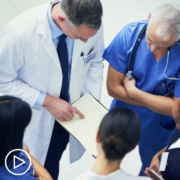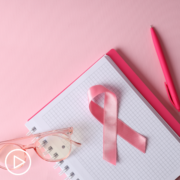Newly Diagnosed with Prostate Cancer? Consider These Key Steps
Newly Diagnosed with Prostate Cancer? Consider These Key Steps from Patient Empowerment Network on Vimeo.
For those who are newly diagnosed with prostate cancer, figuring out what to do next can be overwhelming. Prostate cancer survivor Jim Schraidt outlines advice for patients to encourage self-advocacy and to access resources and support.
Jim Schraidt is a prostate cancer survivor and Chairman of the Board of Directors for Us TOO International. Learn more about Jim Schraidt here.
Related Resources

How Does Us TOO International Support Prostate Cancer Patients and Their Loved Ones? |

How Could You Benefit from Joining a Prostate Cancer Support Group? |

|
Transcript:
Jim Schraidt:
If you’re newly diagnosed, get a second opinion on your biopsy slides. Because reading those slides is as much an art as it is a science. And we’ve had people who will come to our support groups who then went on to have their slides reviewed on a secondary basis. And it’s changed their diagnosis. In one case, a guy discovered that he actually did not have prostate cancer.
And in other cases, it’s changed the grading of the cancer that’s identified in the biopsy, which of course then impacts treatment decisions, whether it’s active surveillance, surgery, radiation, or systemic therapy. So, that would be the first thing. I think the other thing, and I that think this is true for most medical issues, is to get a second opinion, take the time to get a second opinion.
And in the case of prostate cancer, try to do it at a medical center that takes a multi-disciplinary approach to the disease. So, you would be meeting at the outset with a urologist, a radiation specialist, and perhaps a medical oncologist who can really take you through the options, the treatment options for your situation.
And then I guess the final of three items that I would say is find a support group. And even if you want to just join one of the virtual groups and listen and learn, that’s perfectly fine. But learn about the disease you have, and learn about the treatment options, and learn the things that you need to ask your medical practitioners to help you get the best outcome.
Because the happy patient is going to be the one that knows what he’s getting into and makes and accepts that as part of his decision and can focus after treatment on healing and not on treatment regret.







![_[ACT]IVATED Prostate Cancer Toolkit Checklist Checklist](https://powerfulpatients.org/wp-content/uploads/ACTIVATED-Prostate-Cancer-Toolkit-Checklist--180x180.png)


